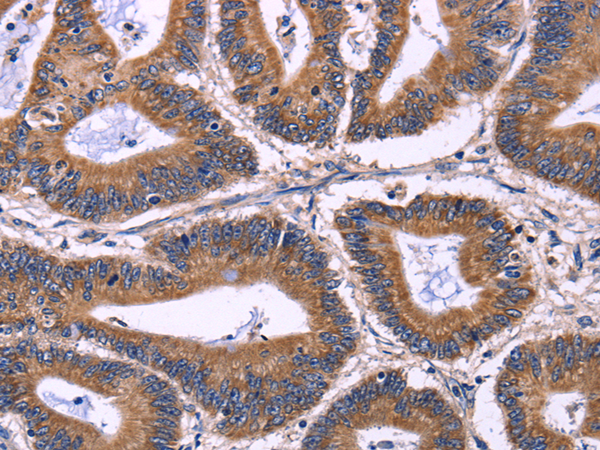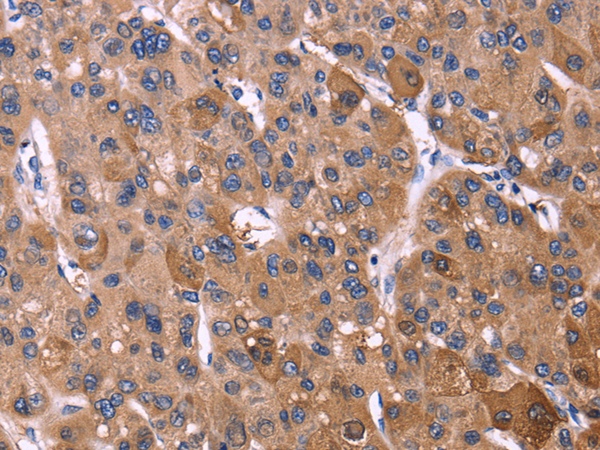

| WB | 咨询技术 | Human,Mouse,Rat |
| IF | 咨询技术 | Human,Mouse,Rat |
| IHC | 1/50-1/100 | Human,Mouse,Rat |
| ICC | 技术咨询 | Human,Mouse,Rat |
| FCM | 咨询技术 | Human,Mouse,Rat |
| Elisa | 咨询技术 | Human,Mouse,Rat |
| Aliases | p58; NKAT; GL183; NKAT2; CD158b; KIR2DL; NKAT2A; NKAT2B; CD158B2; KIR-K7b; KIR-K7c; KIR2DS5; KIRCL23; KIR-023GB |
| Host/Isotype | Rabbit IgG |
| Antibody Type | Primary antibody |
| Storage | Store at 4°C short term. Aliquot and store at -20°C long term. Avoid freeze/thaw cycles. |
| Species Reactivity | Human |
| Immunogen | Fusion protein of human KIR2DL3 |
| Formulation | Purified antibody in PBS with 0.05% sodium azide and 50% glycerol. |
+ +
以下是关于LEKTI抗体的3篇代表性文献,按作者和内容概括整理:
---
1. **文献名称**:*Mutations in SPINK5 encoding a serine protease inhibitor cause Netherton syndrome*
**作者**:Chavanas S, et al.
**摘要**:该研究首次证实SPINK5基因突变导致LEKTI蛋白表达缺失,引发Netherton综合征。研究通过免疫组化(使用抗LEKTI抗体)证明患者皮肤中LEKTI完全缺失,揭示了其与皮肤屏障功能障碍的关联。
2. **文献名称**:*LEKTI proteolytic processing in human primary keratinocytes, tissue distribution, and defective expression in Netherton syndrome*
**作者**:Bitoun E, et al.
**摘要**:利用多克隆抗LEKTI抗体,研究者系统分析了LEKTI在正常人和Netherton患者皮肤中的表达模式及蛋白水解过程,发现其通过抑制丝氨酸蛋白酶(如kallikrein 5/7)调控表皮脱屑,为病理机制提供依据。
3. **文献名称**:*Corneodesmosomal cadherins are preferential targets of stratum corneum trypsin- and chymotrypsin-like hyperactivity in Netherton syndrome*
**作者**:Descargues P, et al.
**摘要**:研究通过Western blot和免疫荧光(使用LEKTI特异性抗体)证明,LEKTI缺失导致角质层蛋白酶活性异常升高,进而破坏桥粒蛋白结构,最终引发Netherton综合征特征性的皮肤屏障缺陷和炎症反应。
---
**备注**:上述文献均聚焦于LEKTI抗体在疾病机制研究中的应用,涉及蛋白定位、功能分析及诊断价值。如需具体实验细节(如抗体克隆号),建议进一步查阅原文方法学部分。
LEKTI (Lympho-Epithelial Kazal-Type-Related Inhibitor), encoded by the SPINK5 gene, is a multi-domain serine protease inhibitor critical for maintaining epidermal barrier integrity. It consists of 15 tandem Kazal-type domains that inhibit kallikrein-related peptidases (KLKs), particularly KLK5. KLK7. and KLK14. which regulate skin desquamation and inflammation. Mutations in SPINK5 lead to LEKTI deficiency, causing Netherton syndrome—a severe genetic disorder characterized by ichthyosis, atopic dermatitis, and immune dysregulation.
LEKTI antibodies are essential tools for studying its expression, localization, and interaction with proteases in both healthy and diseased tissues. In research, they help elucidate LEKTI's role in skin homeostasis, inflammation, and barrier dysfunction. Commercially available antibodies target specific epitopes or domains, enabling applications like immunohistochemistry, Western blotting, and ELISA. Therapeutic antibodies are also under exploration to restore LEKTI function or modulate protease activity in Netherton syndrome. However, challenges remain in developing high-specificity antibodies due to LEKTI's complex structure and homology with other Kazal-type inhibitors. Recent advances in monoclonal antibody engineering and epitope mapping hold promise for improving diagnostic accuracy and targeted therapies for LEKTI-related disorders.
×